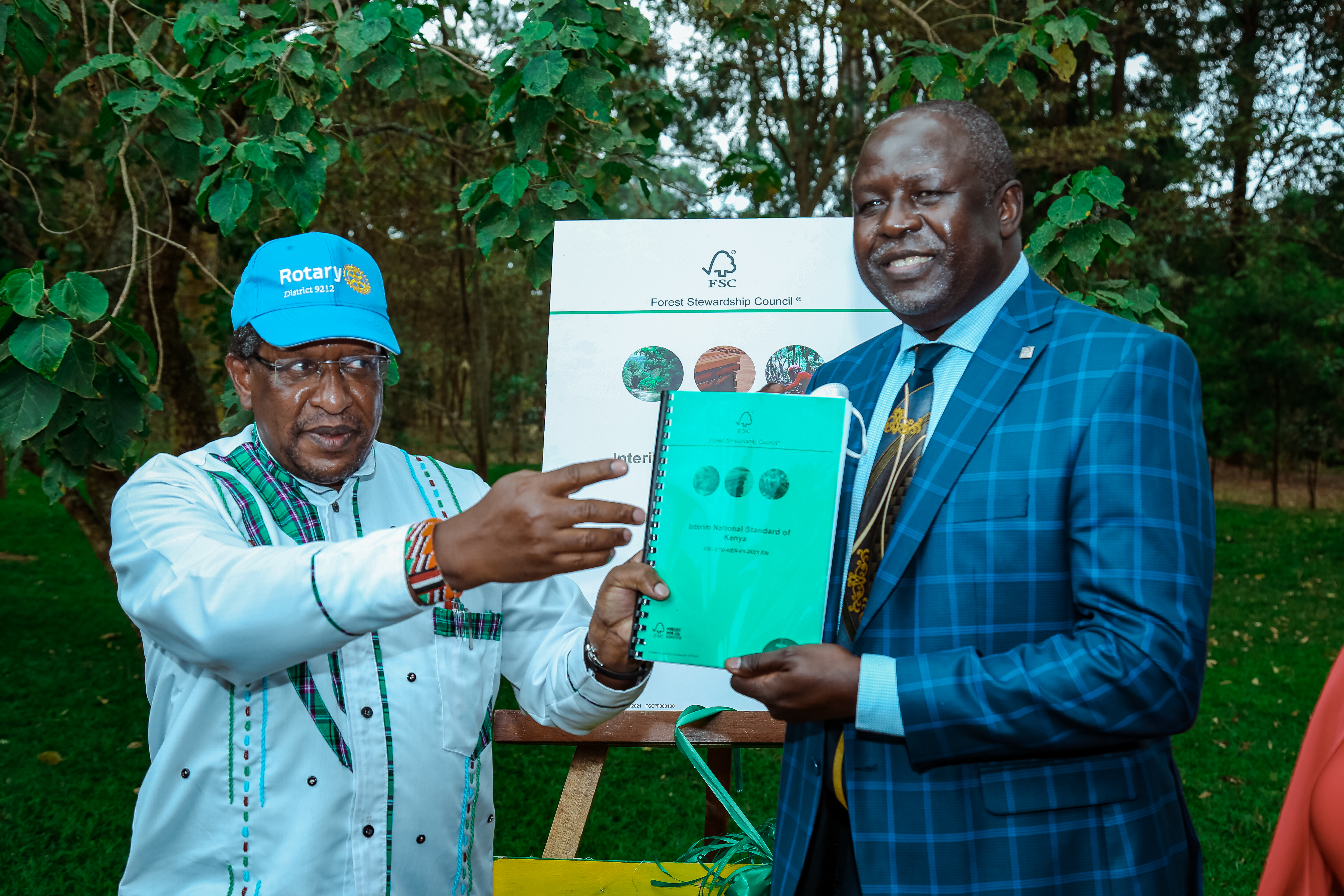The Interim National Standard (INS) of Kenya launched in October 2021
‘We have not inherited the forests from our ancestors, we have borrowed these resources from our future generation’, Hon. Keriako Tobiko, Cabinet Secretary, Ministry of Environment and Forestry.
Ministry of Environment and Forestry Cabinet Secretary, Honorable Keriako Tobiko, on Friday 8th October 2021, officially launched the Interim National Standard of Kenya at Karura Forest Grounds, Nairobi, Kenya.
“The launch of the National Interim Standard of Kenya is a welcome move for the timber industry, it will enable the international markets to embrace wood products produced locally, it is a sign that materials such as furniture or wood have been produced sustainably,” said Hon. Tobiko.
“We have not inherited the forests from our ancestors, we have borrowed these resources from our future generation. Therefore, to ensure the forest sector is well managed, utilized, conserved and protected in the most responsible way, sustainability and global standards are required. The standards are not only good for the environment and the future generation, but also, for business and this is one of such standards I fully associate with and I endorse it’’, Added, Hon. Tobiko.
According to Annah Agasha, Forest Stewardship Council™ (FSC™) Coordinator, Eastern Africa, Kenya is the fourth country in Eastern Africa to have an approved FSC standard. It was approved in January 2021 and became operational in May 2021. She added that the standard will be used by forest owners/managers to ensure compliance with the requirements for responsible forest management, which confirm that a particular forest block or area is being managed in a manner that conserves biological diversity and benefits the lives of local people and workers while ensuring it sustains economic viability. It will also be basis for businesses and consumers to identify, purchase and use wood and wood-based products from well-managed forests in Kenya.
The FSC Regional Director Africa , Dr Harrison Kojwang noted, the Standard will streamline forest management and further allow players in the wood industry to easily access international markets. He noted that due to the effects of climate change, some markets are sensitive and only buy sustainably sourced wood products. Certification will make it easier for the international markets to easily accept our forest products, and will also enable users including the government, and the private sector to assess the sustainable level of forest management and potential benefits from Ecosystem Services claims,” Dr. Kojwang added.

Noting the benefits of the Interim National Standard of Kenya to conservation and the general growth of the local timber industry, Ms. Monica Kalenda, representing the Chief Conservator of Forests at Kenya Forest Service (KFS), a body mandated to take care of forests on behalf of the citizens, said that KFS fully supports the INS of Kenya.
Ms. Kalenda noted that the standard, if used properly, will lead to the reduction of illegal forest activities and also strengthen Kenya’s ability to explore external markets for its wood products.
KFS has agreed to commence an engagement with FSC to pilot certification of the Aberdares forest ecosystem and the Eburu forest. KFS’s efforts in forest certification adds to Komaza, Better Globe Forestry and other players in the forestry sector who are working towards certification of smallholders in Kenya. “We are very happy for the approval and launch of the INS and this is what we have been waiting for, noted Ms. Esther Mutuma of Komaza. Ms. Mutuma noted that the INS matters to them because Komaza works with 2500 smallholders and is currently building a factory for high grade products. ‘Certification will help us to sell our products on international market’ added Ms. Mutuma.
The Managing Director of Tetra Pak in East Africa, Mr. Jonathan Kinisu, noted that Tetra Pak is highly dependent on paper for the production of over 200 billion packages globally and sources all its raw materials from responsibly managed forests. He noted that the FSC Standard is important to articulate and communicate Tetra Pak’s sustainability journey, and an endorsement for its quality products.
“I have pledged to plant one million trees to increase the forest cover in Kenya, and in this October, 100,000 trees will be planted at Oloolua forest”, added Mr. Kinisu.
Other activities that graced the launch event was the planting of trees at Karura forest grounds by the Honorable Cabinet Secretary and other delegates, art presentations and creative environment messages by the youths.
The launch brought together over 70 stakeholders representing at least 30 organizations including key government institutions, bi-lateral and multi-lateral agencies, Civil Society mainly, environmental and social NGOs, smallholder associations and Community Based Organizations (CBOs), conservation and climate change practioners, certification bodies (CBs), certification awareness groups, the youth, and the business community, among others.
For more information, please contact Annah Agasha a.agasha@fsc.org
